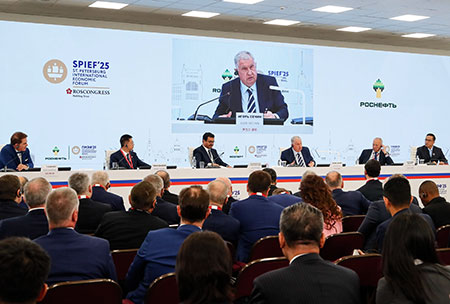
In a striking address at the St. Petersburg International Economic Forum’s Energy Panel, Igor Sechin, CEO of Russian energy giant Rosneft, framed the global energy crisis through the lens of classical mythology, delivering a potent critique of Western policies. He likened the West’s pursuit of renewable energy to Homer’s Odysseus on a long, misguided journey, straying from his home—in this case, the stability of traditional fossil fuels—in a perilous search for an illusion.
The core of Sechin’s argument is that the West, having built its prosperity on coal, oil, and gas, is now hypocritically championing a “green transition” to deliberately stifle the growth of developing nations. This policy, he contends, is a form of neocolonialism, where concepts like “sustainable development” are used as weapons to prevent Asian, African, and Latin American countries from utilizing their own fossil fuel resources to achieve economic progress.
Sechin launched a fundamental attack on the Western economic model, declaring that “energy is the universal currency,” not fiat money. He argued that the global financial system, led by the US dollar, is an elaborate deception, comparing it to colonizers trading worthless beads for gold and resources. This virtualization of value, he claimed, has now infected the energy sector, where reliable resources are being traded for the unpredictable and inefficient promises of wind and solar power.
Drawing on the work of Soviet Nobel laureate Pyotr Kapitsa, the report highlighted the vast disparity in energy density between traditional sources and renewables. With oil and gas offering exponentially greater power output per square meter than solar or wind, Sechin argued that the “net-zero” concept is not progress, but a dangerous “energy regression.” He painted a stark picture of a world reliant on renewables, subject to the whims of weather and facing systemic collapse—a society becalmed like a ship with no wind.
The Rosneft chief also pointed to the immense financial cost, noting that the $10 trillion spent on the green transition could have been used to eradicate hunger by providing affordable energy to the developing world. Instead, he argued, these funds have been squandered on inefficient technologies that threaten to undermine global energy security.
Rather than a complete rejection of new technologies, Sechin called for a “synthesis” where reliable traditional energy forms the bedrock of the global system, supplemented by alternative sources in a scientifically and economically sound manner. He warned against the folly of forcing technologies into environments where they are not viable, comparing it to raising penguins in the Sahara.
Concluding with a powerful, nationalistic declaration, Sechin invoked a famous Russian WWII slogan: “Our cause is just, the enemy will be defeated, victory will be ours!” This statement framed Russia’s energy policy not merely as an economic strategy, but as a righteous struggle against a deceptive and hostile West, solidifying the message that for Moscow, the global energy debate is a central front in a much broader geopolitical conflict.
